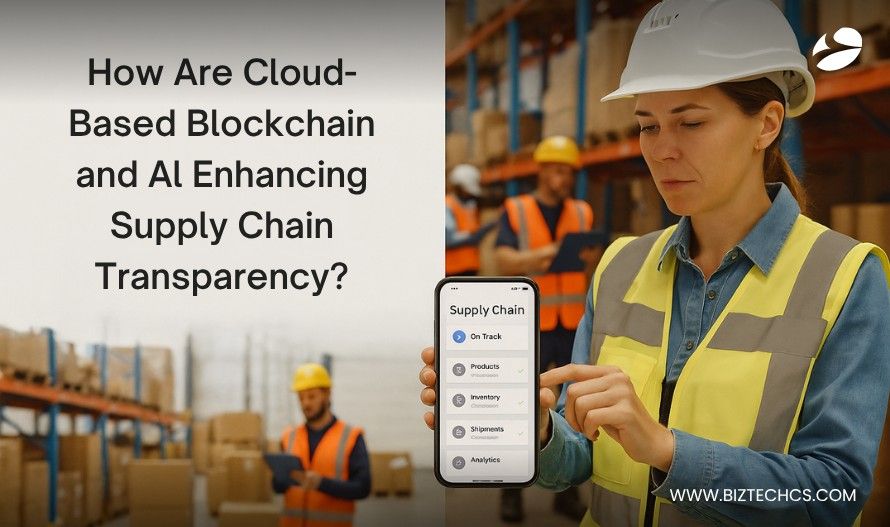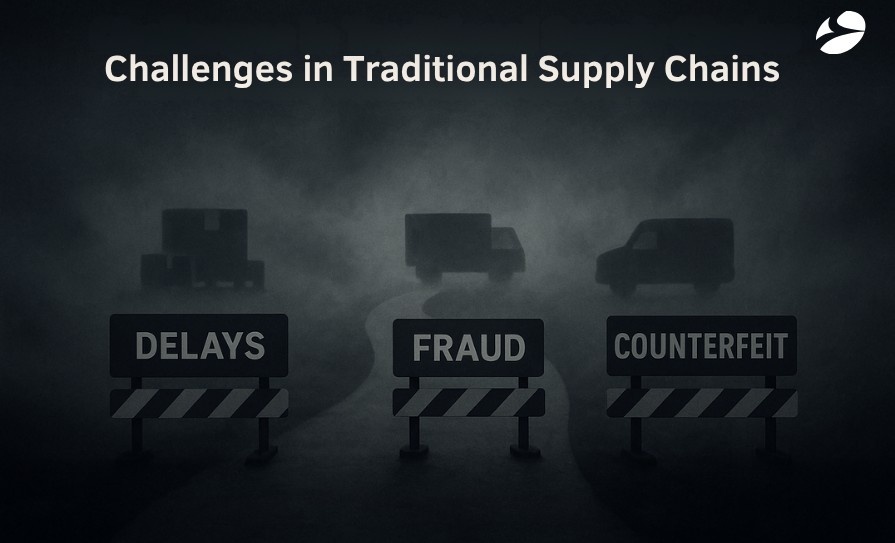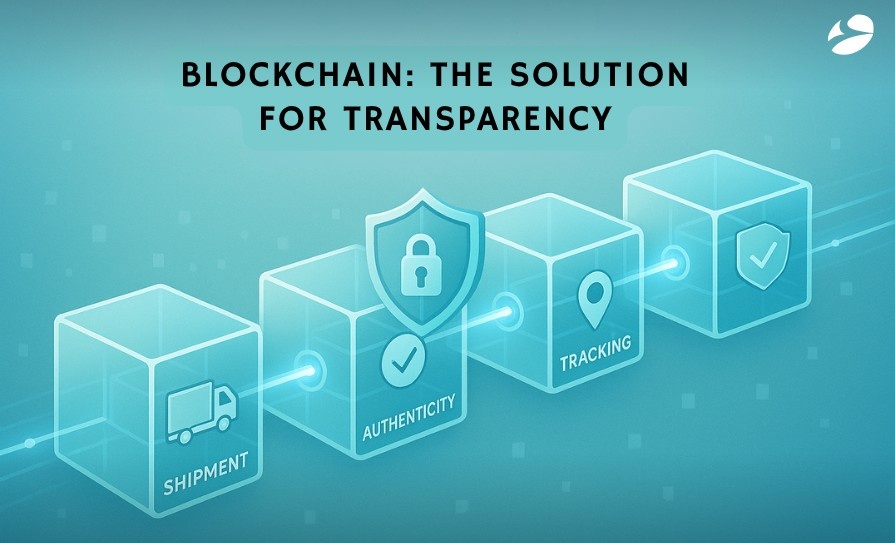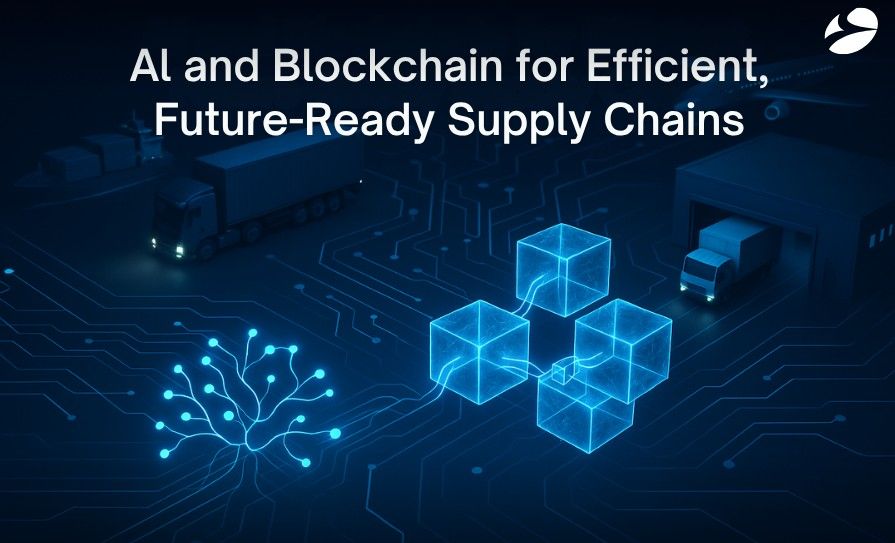How Are Cloud-Based Blockchain and AI Enhancing Supply Chain Transparency?
5 min read
5 min read

Global logistics networks today face mounting challenges — from unpredictable disruptions and rising costs to limited visibility across supply chains. Many businesses still rely on outdated systems and fragmented data, making real-time collaboration and traceability nearly impossible. Sure, 57% of manufacturers have already moved to cloud computing at the facility or network level (Deloitte), but that means nearly half are still managing global operations with systems that have the sophistication of a flip phone at a smartphone convention.
Your shipment tracking system probably has the accuracy of a weather forecast made by a fortune cookie, and verifying if that “ethically sourced” coffee actually came from fair-trade farms requires the detective skills of Sherlock Holmes on steroids.
Are those manufacturers using the cloud? They’re getting a taste of transparency, but without blockchain’s immutable ledger, they’re essentially putting a Band-Aid on a broken leg. Meanwhile, counterfeit products slip through easier than a greased pig at a county fair, turning your carefully managed brand into a knockoff lottery.
The old paper-trail system works about as well as using smoke signals in a hurricane, and even basic cloud adoption can’t solve the trust problem when every supplier swears their data is accurate right before another compliance violation surfaces.
Cloud-based blockchain paired with ai/ml development services transforms this half-hearted digitalization into an actual business operation where every transaction gets recorded, verified, and locked tighter than a miser’s wallet.
These technologies turn supply chain transparency from a pipe dream into Tuesday’s reality check, letting businesses catch fraud before it happens rather than discovering it during the annual “where did all our money go” meeting.
Traditional supply chains? A total mystery. Like opening a box and hoping for the best, but not the kind of surprise you want. No transparency here – just a lot of guesswork. Tracking a product’s journey? You’ll get about as much insight as a blindfolded person at a dartboard competition.
Verifying authenticity? Good luck. Tracing the origins? You might as well try finding a needle in a haystack. This lack of visibility poses significant risks. Inefficiencies pile up like laundry in a teenager’s room. And let’s not even talk about the fraud and counterfeit products slipping through the cracks.
It’s like trusting your leftovers in a fridge with a door that doesn’t close properly. Blockchain in supply chain? Yes, that could resolve this issue. AI-powered supply chain management could also help, but achieving this goal will be challenging due to the presence of outdated and foggy systems.
It’s time for a serious upgrade – cloud-based blockchain solutions and AI and blockchain for logistics might just be the magic wand to wave this whole mess away.
But here’s what executives often ask: “What’s the real cost of staying with our current system versus making the blockchain leap?” The answer hits harder than expected – companies lose an average of 3.5% of revenue annually due to supply chain inefficiencies and fraud.
When you factor in the reputational damage from counterfeit products or compliance failures, the cost of inaction becomes a ticking time bomb. The investment in blockchain technology typically pays for itself within 18 to 24 months through reduced fraud, fewer disputes, and streamlined operations.
AI Expert Tip: Before implementing blockchain, deploy AI-powered anomaly detection on your existing supply chain data. This helps identify the most critical transparency gaps and fraud patterns, allowing you to prioritize blockchain implementation where it delivers maximum ROI.

Cloud-native blockchain removes the mystery from supply chains by utilizing distributed ledger technology, where every transaction is recorded and visible to all parties, much like an open book that no one can secretly edit.
The beauty lies in immutability because once data is written, it cannot be erased, which kills the habit of rewriting history faster than a politician caught in a scandal. Security is baked into the system, making fraudsters feel like burglars trying to rob a bank guarded by tanks.
Scalability in the cloud means the system grows with business needs, rather than collapsing under pressure like a cheap umbrella in a storm.
At BiztechCS, we implement scalable cloud-based blockchain solutions that move companies from black-box chaos to transparent, trackable ecosystems.
A question that C-suite leaders frequently raise is: “How do we protect sensitive business data while maintaining transparency?” The answer lies in permissioned blockchain networks where visibility is controlled yet comprehensive.
Companies can share relevant information with partners while keeping proprietary data secure through encryption and access controls. It’s like having a glass door with selective tinting – you decide who sees what, when, and how much.

Blockchain in the supply chain becomes practical because it delivers real-time tracking, allowing businesses to know exactly where goods are, rather than relying on vague excuses like “stuck in transit” for the tenth time. Immutable records ensure data cannot be tampered with, which makes fraudsters sweat more than liars on a lie detector.
AI-powered supply chain management incorporates forecasting and risk detection, enabling surprises to be handled with intelligence, not panic. Smart contracts automate compliance payments and deliveries, so no one has to chase suppliers like debt collectors on speed dial.
Business leaders consistently wonder: “How quickly can we see measurable ROI from blockchain implementation?” The metrics speak for themselves – companies typically see a 15-20% reduction in administrative costs within the first year, 30% faster dispute resolution, and a 50% reduction in paperwork processing time. These aren’t pie-in-the-sky projections but actual results from real implementations.
At BiztechCS, we develop smart contract frameworks that automate supplier compliance and cut down the mountain of administrative overhead. We design systems that replace manual follow-ups with self-executing agreements, ensuring tasks are completed efficiently.
We help transform ai/ml development services and blockchain for logistics into a working reality where processes flow smoothly and accountability is not optional but guaranteed.
Is manual supplier management eating up resources that could drive growth instead? Smart contracts and AI-powered automation could be handling this while you sleep.
Blockchain technology is revolutionizing industries by providing transparency, security, and efficiency in processes that were once prone to fraud, inefficiency, and lack of traceability. Let’s explore some key sectors where its ai application development services is making a significant impact.
Retail chains and online marketplaces bleed billions every year because of counterfeit products and shady sourcing. Customers want to know their “luxury” handbag is not stitched in a garage by someone’s drunk cousin.
Blockchain in the supply chain enables retailers to verify product authenticity and maintain accurate ethical sourcing records that cannot be falsified later.
Senior management often asks: “Will this technology integrate with our existing ERP and inventory systems, or are we looking at a complete overhaul?” The good news is that modern blockchain solutions are designed to complement, not replace, existing infrastructure.
APIs and middleware solutions create bridges between blockchain networks and legacy systems, allowing gradual adoption without disrupting daily operations. It’s like adding a security system to your house – you don’t need to rebuild the entire structure.
A transparent ledger ensures that buyers get the real deal, rather than a knockoff that falls apart faster than a cheap umbrella.
Retailers also build trust when they show clear data about where and how a product was made. Cloud-based blockchain solutions provide visibility into each step, transforming customer confidence from a gamble into a guarantee. Transparency stops being marketing fluff and becomes a competitive edge.
Pharma supply chains are under continuous scrutiny because they are not appropriately monitored. The issue of counterfeit medicines is not only one of deceit but also a matter of life and death.
Monitoring a drug’s journey from the place of production to the patient is like keeping proof of purchase in case of a death audit.
Blockchain ensures that every batch is traceable and non-modifiable, thereby resolving the issue that has led to an estimated 10% of medical products in low- and middle-income countries being either of poor quality or counterfeit (World Health Organization).
A combination of AI-powered and blockchain-based supply chain management will enable the detection of potential risks and ensure compliance with regulations, preventing companies from incurring fines that exceed their research budgets. Additionally, smart contracts perform supplier checks and delivery verifications automatically, thereby reducing mistakes that lead to time and financial wastage.
The ultimate outcome is a pharmaceutical chain where data plays a role similar to that of rocks, which are very hard to break, rather than paper, which can be easily torn.
Healthcare executives frequently inquire: “How does blockchain handle evolving regulatory requirements across different regions?” The platform’s flexibility is key here – smart contracts can be updated to reflect new compliance requirements without disrupting the underlying data integrity.
Regulatory bodies actually prefer blockchain’s audit trail because it provides indisputable evidence of compliance at every step. When FDA inspectors come knocking, the documentation is already there, timestamped and immutable.
Trust is gradually built up because compliance is now assured through internal processes, whereas it was previously dubious and required verification through paper trails.
With the advent of cloud-based blockchain solutions and the integration of AI and blockchain in logistics, the AI Development Company is entering a new era of transparency and efficiency.
Food supply chains are messy because everyone wants to brag about “farm-to-table,” while the food sometimes travels half the globe before reaching the plate. Consumers want to know if their “organic apple” is truly organic — or just washed with tap water and hope.
Blockchain ensures traceability from farm to fork, so food safety and authenticity are not up for debate. It helps reduce waste by providing accurate data on storage and transportation conditions, addressing part of the 1.3 billion tons of food wasted globally each year (FAO, Global Food Losses and Food Waste).
AI and blockchain in logistics can identify bottlenecks and prevent spoiled goods from clogging warehouses, much like bad leftovers.
Farmers also benefit because they can demonstrate fair sourcing without relying on middlemen — using transparent digital records instead of creative storytelling.
The outcome is safer food, less waste, and supply chains that no longer play hide-and-seek with accountability.
AI Expert Tip: Deploy computer vision AI at critical handoff points to automatically capture and verify product conditions before writing to the blockchain. This eliminates human error in quality assessments and creates visual proof that becomes part of the immutable record.
BiztechCS brings deep expertise in implementing cloud-based blockchain solutions that replace confusing black-box operations with transparent systems that actually make sense. Our approach is built on microservices, so scalability is not a headache but a natural outcome, whether the project is as small as a pilot or spans an entire enterprise.
We design blockchain in supply chain models that grow without collapsing like a poorly built sandcastle in high tide. Our team supports both cautious first steps and full-scale rollouts without treating clients like guinea pigs in a lab experiment.
At BiztechCS, we follow a consultative approach, enabling businesses to adopt blockchain and AI smoothly, rather than feeling like they’ve signed up for a crash course in rocket science. We help create ecosystems where AI-powered supply chain management and AI and blockchain for logistics run seamlessly and actually deliver results.
Our solutions are structured for trust, transparency, and growth, not endless jargon. The aim is simple: supply chains that stop acting like a magician’s hat, where no one knows what might pop out next.
Ready to see how other industry leaders transformed their supply chain chaos into competitive advantage? Your transparent, scalable blockchain solution is just one conversation away.
Cloud-based blockchain and AI solutions are transforming business operations by providing enhanced security, efficiency, and reliability. Let’s dive into the key outcomes companies can expect from integrating these technologies.
When using cloud-based blockchain solutions, businesses gain complete transparency. Every transaction is recorded and verified in an immutable ledger. No more last-minute “adjustments” to records when things go wrong.
The data is set in stone—literally. This ensures that all stakeholders can see what’s happening, from start to finish. Fraudsters can’t “update” anything on the sly, and data manipulation becomes a thing of the past. Blockchain in the supply chain doesn’t leave room for shady business or wild guessing games.
Leadership teams often need to know: “What’s the realistic timeline from pilot to full implementation?” Based on AI Development Company benchmarks, a pilot program typically runs 3-4 months, followed by a phased rollout over 12-18 months for enterprise-wide adoption. The key is starting with high-impact, low-complexity use cases – like tracking high-value items or critical components – then expanding as teams gain confidence and see results.
Rome wasn’t built in a day, and neither is a transparent supply chain, but with the right approach, you’re looking at transformation in quarters, not decades.

AI-powered supply chain management enables firms to operate efficiently, with minimal disruptions. AI examines vast amounts of data, discovers patterns, and forecasts future trends effortlessly. It accelerates processes like a Formula 1 pit crew. Manual inspections and guesswork, which can be incorrect, are no longer necessary.
AI detects inefficiencies faster than a hawk detects a rabbit. With proper data, companies become like a seamless machine, thus saving time and money.
Trust is priceless in any supply chain, and blockchain ensures authenticity and ethical sourcing at every step. No more pretending that the “organic” coffee beans came from a sunny farm when they were really sourced from a factory.
Blockchain tracks and verifies goods from their origin, ensuring they are what they claim to be. Ethical sourcing becomes an open book, not just a marketing slogan. Customers can rest easy knowing they aren’t being sold a story that was made up.
When everything is traceable, businesses build trust faster than a politician’s popularity drops after a scandal.
Cloud-based blockchain solutions and ai/ml development services enable businesses to become future-ready by eliminating outdated processes. With blockchain, supply chains are always up-to-date, always visible, and constantly evolving. There’s no waiting for the next technological “revolution” when your operations are already running on the most advanced systems available.
Future-proofing isn’t a gamble when the foundation is built on immutable, verifiable tech. Businesses stop playing catch-up and start leading the pack.
Trust and transparency are the bedrock of any effective supply chain. Without them, businesses are left navigating a minefield of inefficiencies, fraud, and missed opportunities. Cloud-based blockchain solutions combined with AI-powered supply chain management offer the ideal remedy, ensuring that every transaction is traceable, verifiable, and tamper-proof.
These technologies offer a way out of the chaos, making supply chains not just visible but also accountable. No more guessing games, no more half-baked excuses—just cold, complex data that can’t be fudged.
At BiztechCS, we ensure that businesses not only survive but thrive by implementing scalable solutions that evolve with their needs. We build ecosystems where blockchain and ai/ml development services work hand in hand to provide clarity, enhance trust, and ensure every step is accounted for.
The future of supply chain transparency is here, and BiztechCS is ready to lead the charge. We don’t just talk the talk, we build systems that walk the walk.
Is your supply chain ready to become the gold standard of transparency and efficiency in your industry? Don’t let competitors beat you to the blockchain advantage.

Artificial Intelligence (AI)
33
By Nandeep Barochiya

Odoo
71
By Uttam Jain

Odoo
62
By Uttam Jain